10 Most Sustainable Natural Fiber Clothing Brands: The Conscious Consumer’s Guide
Affiliate Disclosure
Hey fellow impactful ninja ?
You may have noticed that Impactful Ninja is all about providing helpful information to make a positive impact on the world and society. And that we love to link back to where we found all the information for each of our posts.
Most of these links are informational-based for you to check out their primary sources with one click.
But some of these links are so-called "affiliate links" to products that we recommend.
Why do we add these product links?
First and foremost, because we believe that they add value to you. For example, when we wrote a post about the environmental impact of long showers, we came across an EPA recommendation to use WaterSense showerheads. So we linked to where you can find them. Or, for many of our posts, we also link to our favorite books on that topic so that you can get a much more holistic overview than one single blog post could provide.
And when there is an affiliate program for these products, we sign up for it. For example, as Amazon Associates, we earn from qualifying purchases.
What do these affiliate links mean for you?
First, and most importantly, we still only recommend products that we believe add value for you.
When you buy something through one of our affiliate links, we may earn a small commission - but at no additional costs to you.
And when you buy something through a link that is not an affiliate link, we won’t receive any commission but we’ll still be happy to have helped you.
What do these affiliate links mean for us?
When we find products that we believe add value to you and the seller has an affiliate program, we sign up for it.
When you buy something through one of our affiliate links, we may earn a small commission (at no extra costs to you).
And at this point in time, all money is reinvested in sharing the most helpful content with you. This includes all operating costs for running this site and the content creation itself.
What does this mean for me personally?
You may have noticed by the way Impactful Ninja is operated that money is not the driving factor behind it. It is a passion project of mine and I love to share helpful information with you to make a positive impact on the world and society. However, it's a project in that I invest a lot of time and also quite some money.
Eventually, my dream is to one day turn this passion project into my full-time job and provide even more helpful information. But that's still a long time to go.
Stay impactful,
Amid growing concerns about the environmental impact of the textile industry, the spotlight is shifting toward natural fibers as the eco-friendly materials for making clothing. Plant-based fibers such as linen, kapok, and ramie have garnered much attention for their sustainability attributes. But are all natural fibers equally sustainable, or are some potentially a bit greenwashed? So, we had to ask: Which are the most sustainable natural fiber clothing brands?
The most sustainable linen clothing brands include MATE the Label, NATASHA TONIC, and Finisterre, which use low-impact natural fibers, employ full traceability, and strive for textile circularity. In addition, Opera Campi and Nui Organic commit to lowering carbon emissions and chemical usage.
Whether you are searching for a T-shirt, a sweater, or some comfortable underwear to add to your wardrobe without negatively impacting the soil, the water, the animals, and other people, there is a brand for you. So, let’s keep reading to learn more about the most sustainable linen clothing brands and how they ensure sustainable, ethical practices.
Here’s How Sustainable Natural Fibers Generally Are
Natural fibers, either coming from plants or animals, are generally renewable and biodegradable, unlike synthetic fibers derived from fossil fuels. However, growing certain crops or raising certain animals for fibers can have such significant adverse environmental impacts that they reduce the overall sustainability of the fabrics. The Common Objective’s Made-By Environmental Benchmark for Fibres ranks natural fibers in a wide range, from class E, the least sustainable fiber class, to class A—the most sustainable fiber class.
“Sustainable: The ability to be maintained at a certain rate or level | Avoidance of the depletion of natural resources in order to maintain an ecological balance”
Oxford Dictionary
To understand the sustainability of natural fibers, we’ve assessed the life-cycle and each stage’s sustainability. This life-cycle assessment (LCA) is a method to evaluate the environmental impacts of products and materials. Here’s a quick summary of our LCA of natural fiber!
What makes sustainable natural fibers: Hemp and linen are two plant-based natural fibers with the highest level of sustainability. These fiber crops are often grown and processed without toxic synthetic chemicals and heavy irrigation and have high carbon sequestration potential, helping to mitigate the climate crisis.
Additionally: Some fiber crops also provide other products along with fibers. For example, flax plants provide oil, food, and dietary supplements, as well as linen fibers.
Here’s How We Selected the Most Sustainable Natural Fiber Clothing Brands
The brands on this list were chosen based on their commitment and actions to promote sustainable practices while reducing the environmental impacts of the textile industry.
They are transparent about their materials, processes, and workforce management within their supply chain.
Some brands focus their efforts on reducing waste and optimizing natural resources while others strive to reduce the carbon footprint of their clothes.
All of these brands share the commitment to reshape the textile industry toward a more sustainable and Earth-friendly sector.
These Are the 10 Most Sustainable Natural Fiber Clothing Brands
Most Sustainable Natural Fiber Clothing Brands
Overall, these natural fiber clothing brands are sustainable. Yet, they take various approaches to reduce environmental impacts and uphold ethical standards. Let’s dive into each brand and find out more.
MATE the Label: Clean From Seed to Skin

“To provide people everywhere with essentials that are clean from seed to skin.”
MATE the Label
🌎
How do they ensure their sustainability?
MATE the Label ensures sustainability by sourcing low-impact natural fibers, reducing carbon footprints, and recycling. They opt for yarns based on plant and animal fibers, including linen, hemp, climate-beneficial cotton, and alpaca. Furthermore, they use non-toxic dyes to color their apparel. Regarding their carbon footprint, MATE the Label manufactures locally (within 15 miles of their office) to reduce transportation emissions. The brand diverts their textile waste (pre- and post-consumer) into making new products. They also have B Corporation and Climate Neutral certifications.
🌐
How do they ensure their ethics?
MATE the Label has a Code of Conduct covering some ILO Four Fundamental Freedoms principles. Specifically, they do final production in US factories where they had banned, since day 1, the piece rate pay—a practice that often leads to wages below minimum wage and unsafe working conditions. They commit to creating safe, comfortable, and fair working environments for everyone in their supply chain, including farmers, garment workers, and recyclers. They also make regular visits to their suppliers.
🤝
Are they part of any giving-back programs?
In 2021, MATE the Label donated 1% of sales to nonprofit partners that are committed to saving the planet. On Giving Tuesday in 2021, they upped the donation from 1% of every purchase to 5%. Since their partnership with BEAM Impact, MATE the Label’s consumers can choose to which organization the donations of their order should go to.
🛍️
What is their product range?
- Best for: minimalistic, versatile clothes for women
- Product range: sweaters, dresses, pants, hoodies, sweatshirts, maternity wear, blouses, T-shirts, jumpsuits, underwear
- Price range: $$
- Size range: XS–XL
NATASHA TONIC: Making Plant-Based Swimwear to Reduce Microplastic Pollution
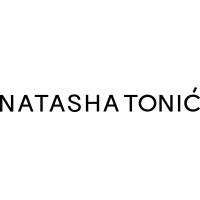
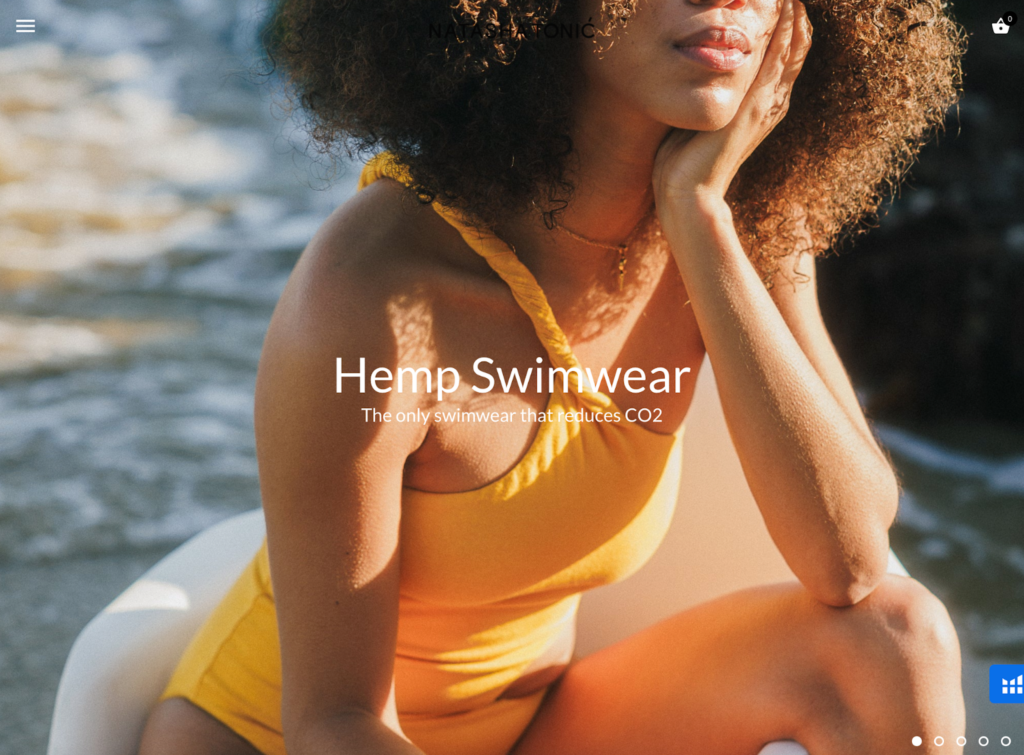
“We make everything locally in small batches to make sure we don’t have a negative impact on the environment.”
NATASHA TONIC
🌎
How do they ensure their sustainability?
NATASHA TONIC prioritizes sustainability through eco-friendly materials, low-impact processes, and low-footprint practices. They source a high proportion of sustainable natural fibers for their swimwear. Their fabric is a blend of mostly plant fibers (hemp and organic cotton) and a small percentage (4%) of spandex (lycra). They also use only low-impact, non-toxic dyes that contain soluble natural components and no heavy metals. Further down the life-cycle in the manufacturing stage, NATASHA TONIC lowers their environmental impacts by applying on-site heat reclamation, on-site water filtration, and no-salt-added dye baths in their dyeing processes. They also use biopolishing in their finishing treatments. Additionally, they reduce their transporting carbon footprint by purchasing fabrics locally in the US and using electric vehicles for delivering between suppliers and studios.
🌐
How do they ensure their ethics?
NATASHA TONIC puts protecting workers and nature at the core of their operations. As such, they trace most of their supply chain, including all of the final and second stages of production. Their second stage of production is audited by the Fair Wear Foundation. Workers at their US factory are all paid according to California standards. NATASHA TONIC protects nature by eliminating contaminants in surface runoff to maintain the surface and groundwater quality and replacing insecticides with natural pest-controlling methods.
🤝
Are they part of any giving-back programs?
NATASHA TONIC donates 5% of every swimsuit sold to 5 Gyres to support fighting plastic and microfibre pollution. Additionally, they contribute to the cause of social movements, including Tree People, Black Lives Matter, and Downtown Women’s Center.
🛍️
What is their product range?
- Best for: womenswear
- Product range: swimwear, tops, blouses, bodysuits, lingerie
- Price range: $$$
- Size range: XS–XL
Finisterre: Ocean-Inspired Sustainable Outdoor Gear Made Ethically

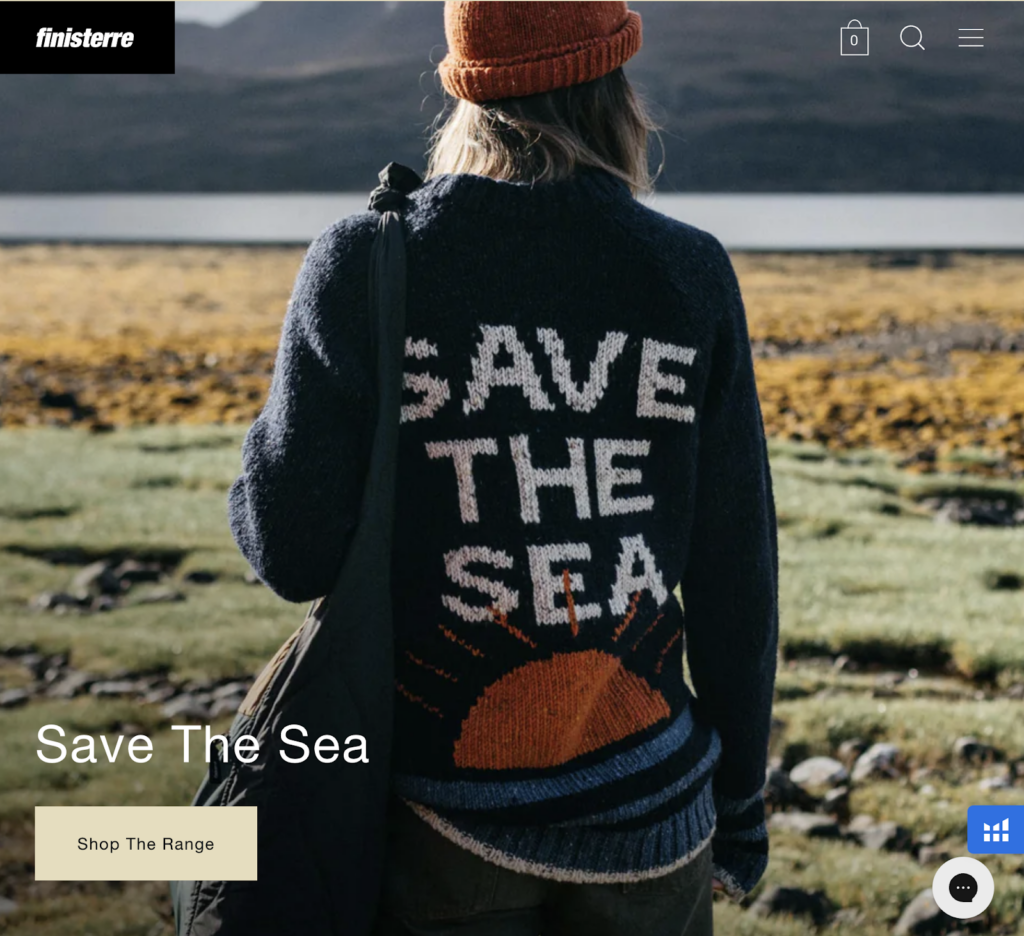
“Yet from our cliff top workshop, we stay true to our original design ethos of functionality and sustainability, remaining committed to product, environment and people.”
Tom Kay, Founder of Finisterre
🌎
How do they ensure their sustainability?
Finisterre places circular sourcing at the center of their sustainability commitment. They use a high proportion of biodegradable natural fibers and finishes, including low-impact hemp and linen fibers, GOTS-certified organic cotton, and high-performing merino wool blends sourced from their own flock of British merino sheep. Furthermore, at least 50% of their clothes are made using recycled fabrics. In 2019, they replaced all plastic packaging with water-soluble, ocean-safe, and biodegradable “Leave No Trace” garment bags. Finisterre strives to reduce textile waste by offering repair services and giving in-store credits for gear trades-in, which are reconditioned for resale. They also implement various incentives to reduce their carbon footprint, including switching more of their stores and offices to renewable energy tariffs and transporting products using less carbon-intensive modes on land and sea. Last but not least, Finisterre is a B Corporation.
🌐
How do they ensure their ethics?
Finisterre is committed to full transparency in their supply chain, holding their partners to the high standards in their Code Of Conduct and their Anti-Slavery & Trafficking Policy. Additionally, they partner with Fair Working Conditions (FWC), enabling the mapping of their supply chain, the screening of suppliers, and targeted audits at high-risk locations. Their facilities are also listed on Open Supply Hub. Finisterre’s ethical values also extend to their dedication to saving the sea. For example, they provide a free resource to inspire ocean activism. Regarding animal rights, they source wool from non-mulesed sheep.
🤝
Are they part of any giving-back programs?
Finisterre provides financial support to various giving-back campaigns and programs through the Finisterre Foundation, championing ocean access for all. For example, Finisterre turned 2021’s Black Friday into Blue Friday, where they swapped discounts for donations, raising funds for The Wetsuit Project, which adapts wetsuits for children and adults with various disabilities to access the sea. In 2022, Blue Friday was used again to raise money supporting Level Water to provide specialist swimming lessons for children with disabilities. Other projects include The Seasuit Project, City Kids Surfing, Seasuit Donation, and Art Auctioning for Good.
🛍️
What is their product range?
- Best for: menswear, womenswear
- Product range: shirts, pants, tops, sweaters, dresses, hoodies, shorts, denim, swimwear, jackets, blazers, sweatshirts, T-shirts, base layers, socks, shorts,
- Price range: $$
- Size range: XS–XXL
Opera Campi: Innovative Hemp Fabrics Offset By Tree Planting
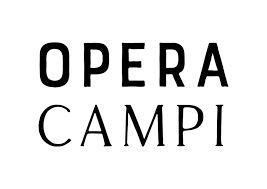
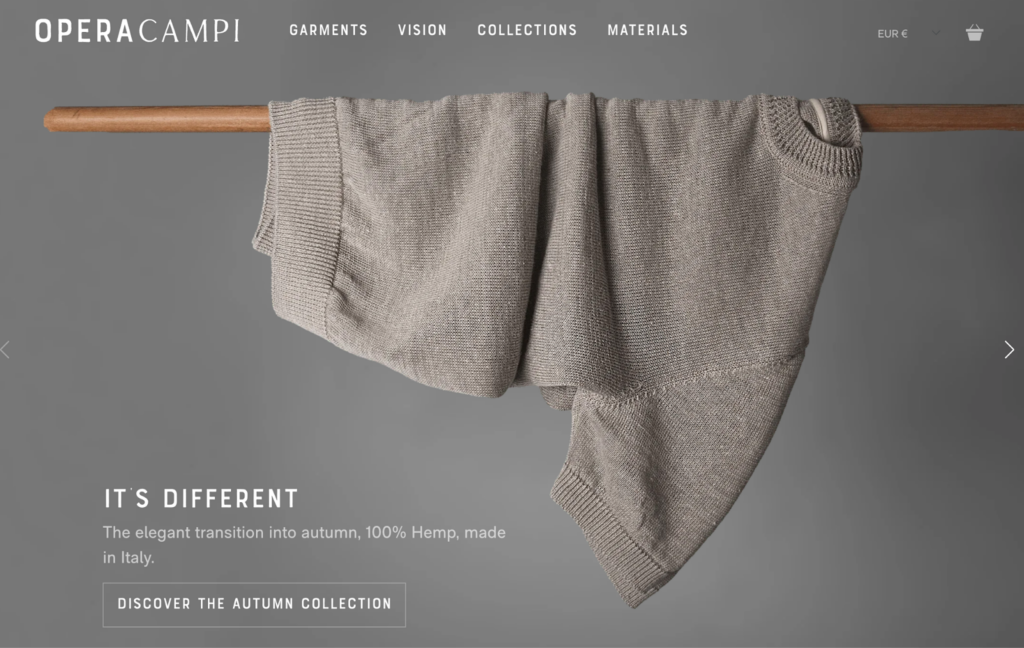
“We pioneer a radical concept of sustainability based on flexible production, new hemp-based material, minimal packaging and more.”
Opera Campi
🌎
How do they ensure their sustainability?
Opera Campi ensures their sustainability by making innovative low-impact natural fabrics based on hemp fibers, in consideration of the plant’s high carbon sequestration potential and low irrigation requirement. Their hemp T-shirt’s emission is less than 3kg CO₂, which is half of a common cotton T-shirt’s emission. Their “Sempre Zero” sweater, an undyed hemp knitwear, is carbon-negative (cradle-to-gate). Opera Campi operates a made-to-order system, preventing fabric waste and saving water. They also use simple packaging, which is either recyclable or compostable. Additionally, Opera Campi plants two trees for every clothing item ordered, offsetting carbon emissions during the manufacturing and transporting stages.
🌐
How do they ensure their ethics?
Opera Campi engineers, designs, and produces their hemp clothing in Italy, an EU member country upholding the group standards about fair wages and safe working conditions. They also trace most of their supply chain.
🤝
Are they part of any giving-back programs?
Opera Campi plants two trees for every garment ordered.
🛍️
What is their product range?
- Best for: menswear, womenswear,
- Product range: shirts, pants, jackets, blazers, knitwear, T-shirts, shorts, plus-size
- Price range: $$$
- Size range: XXS–XXXL
Nui Organics: Put People and the Planet First


“We create high-quality, low-impact apparel in timeless, long-lasting styles using only sustainable materials and an ethical supply chain.”
Nui Organics
🌎
How do they ensure their sustainability?
Nui Organics approaches sustainability by making long-lasting products with natural materials. They use blends of natural fibers, including GOTS-certified organic merino wool, alpaca wool, silk, and GOTS-certified organic cotton. Additionally, they have OEKO-TEX® Standard 100 certification, guaranteeing no harmful substances are found in their textile materials. Regarding the manufacturing process, Nui Organics lowers their environmental impacts by relying on renewable energy and integrated processes in manufacturing, using low-impact, non-toxic dyes in most of their products, avoiding harsh chemicals in fabric treatment (for example, no chlorine in merino wool treatment), and treating wastewater the standard of OEKO-TEX Detox to Zero. They are certified by Bluesign® for sustainable manufacturing. Furthermore, Nui Organics is a part of the Responsible Packaging Movement, actively eliminating single-use plastic and virgin forest fiber from packaging. Their newest collections are delivered in FSC-certified 100% recyclable paper bags. Lastly, they run the (re) Nui platform where consumers can buy and sell pre-loved Nui garments to keep them in circulation, reducing waste and bettering the planet.
🌐
How do they ensure their ethics?
Nui Organics works exclusively with factories that share their commitment to ethics and sustainability, both for the environment and for society. Their suppliers are certified by GOTS, OEKO-TEX®, Bluesign®, SA 8000, and Sedex, adhering to ethical practices and improving working conditions. Nui Organics traces and audits most of their partners in the supply chain.
🤝
Are they part of any giving-back programs?
Nui Organics is not known to be part of any giving-back programs.
🛍️
What is their product range?
- Best for: womenswear, menswear, kidswear
- Product range: sweaters, knitwear, tops, blouses, T-shirts, socks, stockings, tights, accessories
- Price range: $$
- Size range: XS–XXL
WAMA: The Pioneer in Underwear Made in Natural Fiber from Hemp Plants
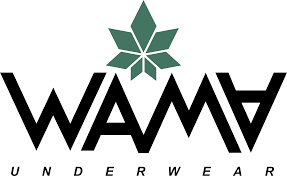
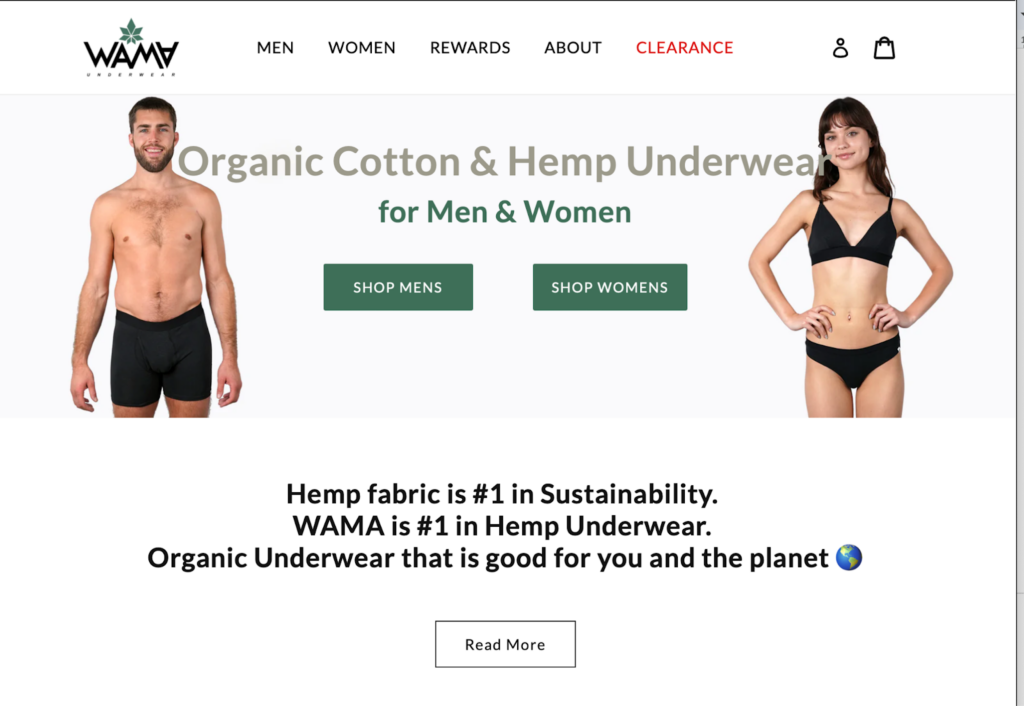
“We believe hemp is the answer to cut down on pollution and save nature.”
Shakib Nassiri, founder of WAMA
🌎
How do they ensure their sustainability?
WAMA ensures sustainability by creating low-impact fabrics based on the natural fibers from organically grown hemp plants, in consideration of the crop’s high carbon sequestration potential and low inputs. Their materials are organic and contain no excess harmful toxins. On top of that, their supply chain includes family-run organic farms, where hemp fibers are extracted using only water and dew—the most sustainable retting method—as well as an organic hemp spinner, an OEKO-TEX®-certified factory where their hemp-based fabrics are finished using low-impact dyes, and other factories complying with the BSCI system. WAMA undies are delivered in custom boxes made from 100% recycled materials, recycled poly mailers, and naturally biodegradable tissue paper.
🌐
How do they ensure their ethics?
WAMA ensures their ethics through full transparency about their supply chain. Their facilities are upheld by their supplier code of conduct, which covers all of the ILO Four Fundamental Freedoms principles, ensuring opportunities for safe work, economic development, and sustainable business. The factories where their products are sewn are BSCI certified, which means safe workplace standards for all employees. Finally, WAMA is a Green America Certified Business and a PETA-Approved Vegan brand.
🤝
Are they part of any giving-back programs?
WAMA is not known to be part of any giving-back programs.
🛍️
What is their product range?
- Best for: womenswear, menswear
- Product range: underwear, bralettes, plus-size
- Price range: $$
- Size range: XS–XXXL
People Tree: The Pioneer to Fair Trade Fashion
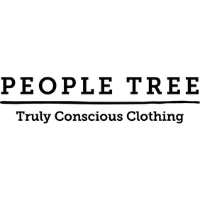
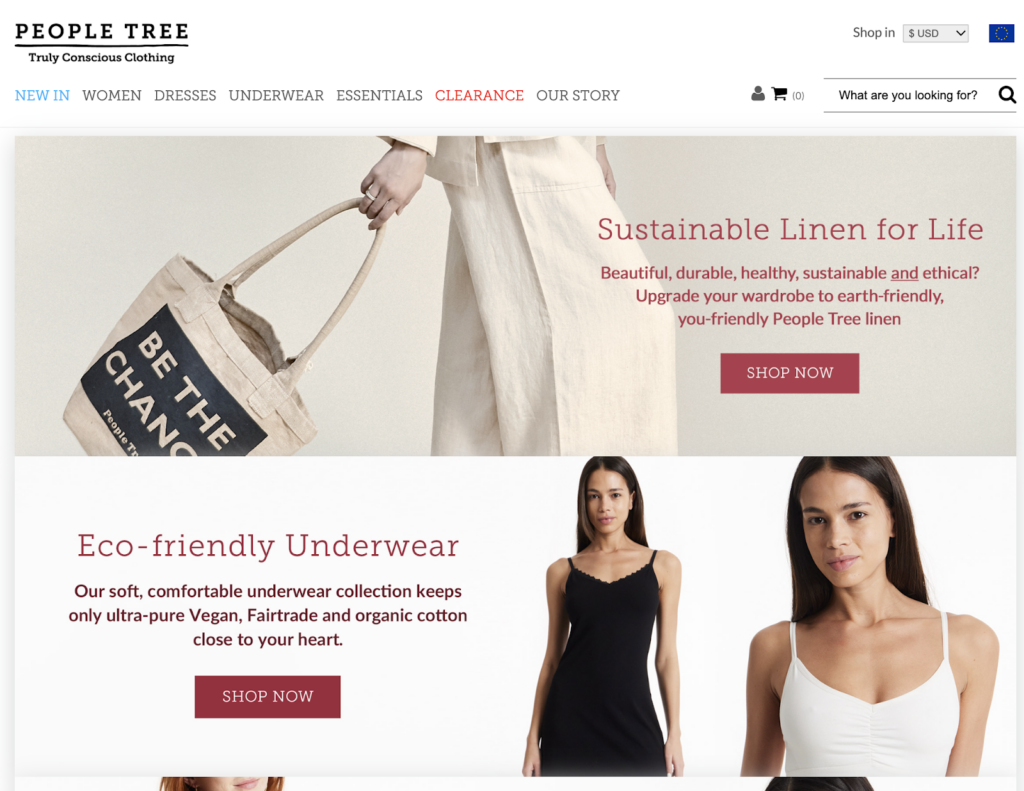
“ We build awareness to empower customers and producers to participate in Fair Trade and environmentally sustainable solutions.”
People Tree
🌎
How do they ensure their sustainability?
People Tree ensures sustainability by opting for low-impact materials, processes, and techniques. They only use natural fabrics made with low-impact fibers such as linen and GOTS-certified organic cotton or semi-natural/ semi-synthetic fabrics that follow closed-loop processes (such as TENCEL™). The brand uses low-waste cutting techniques to maximize fabric use. Their packaging is recyclable.
🌐
How do they ensure their ethics?
People Tree puts fair trade and ethical production practices at the core of the brand. They are a pioneer of fair trade fashion, guaranteeing better prices, decent working conditions, local sustainability, and fair terms of trade for farmers and workers in the Global South. They are also a member of the World Fair Trade Organization, which works on the 10 Principles of Fair Trade, including opportunities for disadvantaged producers and commitment to no child labor or forced labor.
🤝
Are they part of any giving-back programs?
People Tree is actively involved in initiatives to improve access to education for adults and children in the most vulnerable communities and programs that support people with disabilities and disadvantages. They also campaign for fair trade, sustainability, and social justice.
🛍️
What is their product range?
- Best for: womenswear
- Product range: skirts, dresses, pants, tops, blouses, jumpsuits, socks, underwear
- Price range: $$
- Size range: S–XL
Beaumont Organic: Create “Contemporary Conscious Clothing” Responsibly

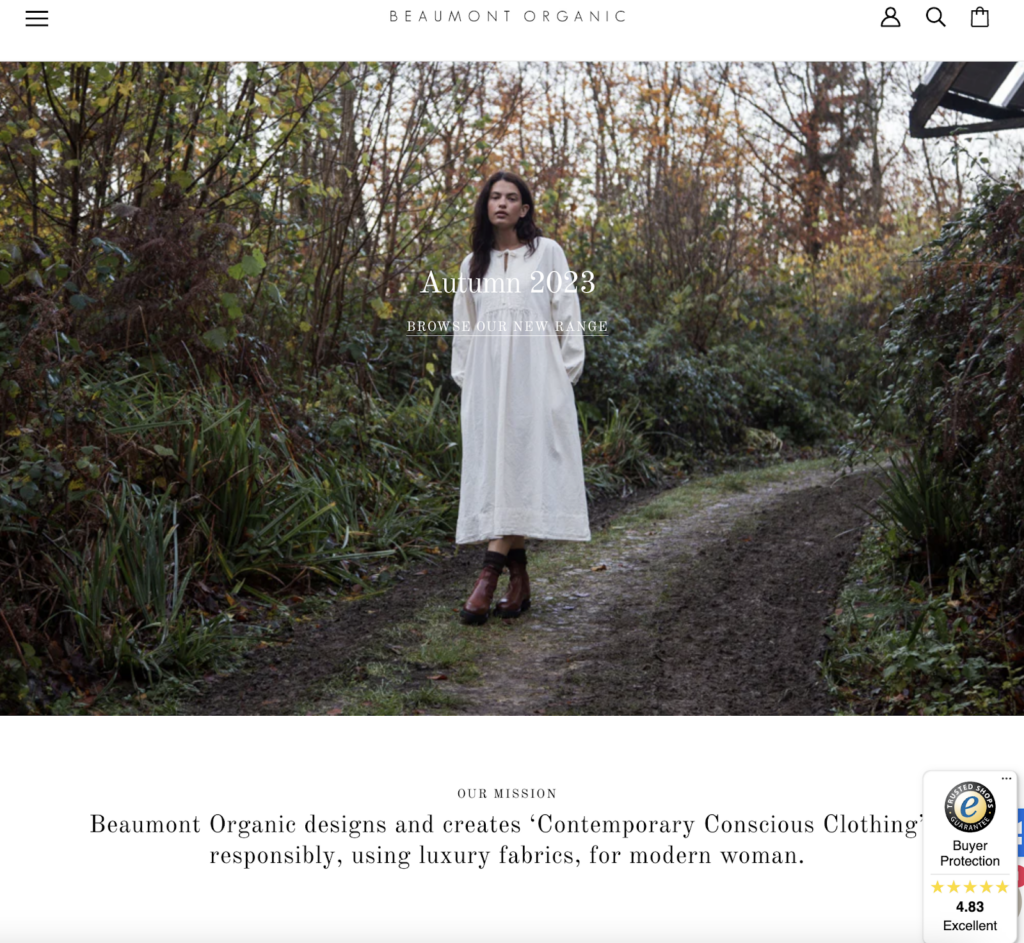
“We work hard behind the scene to provide you with full transparency into the sustainability of our practices and our suppliers”
Beaumont Organic
🌎
How do they ensure their sustainability?
Beaumont Organic prioritizes sustainability by sourcing organic and eco-friendly materials, using renewable energy in their supply chain, and reducing waste by using recycled packaging and offering clothes repairs. Additionally, they promote textile circularity with their online circular resale scheme, allowing customers to pass their pre-loved garments onto a new home. The brand features natural fibers like GOTS-certified organic cotton and organic linen.
🌐
How do they ensure their ethics?
Beaumont Organic is fully transparent about the final stage of their clothes: European factories that pay fair wages and have good working conditions. Beaumont Organic uses wool accredited by the Responsible Wool Standard, guaranteeing the welfare of the animals in their supply chain.
🤝
Are they part of any giving-back programs?
The Beaumont Organic Foundation has supported various community give-back projects in Fiji, including hospital renovations.
🛍️
What is their product range?
- Best for: womenswear, babywear, homeware, accessories
- Product range: shirts, pants, jackets, blazers, knitwear, blouses, underwear
- Price range: $$$
- Size range: XS–XXL
VAUDE: Outdoor Gear and Apparel Where Performance Meets Ecology

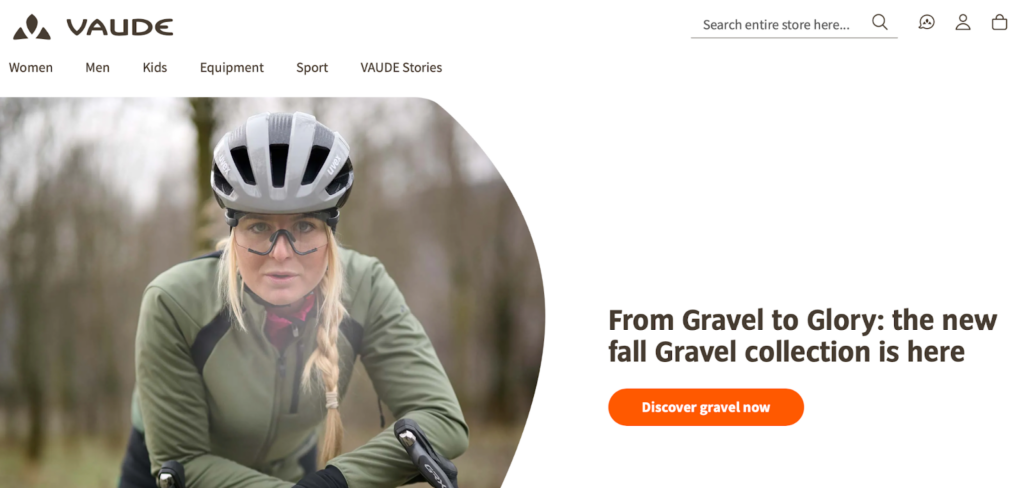
“We design with a focus on minimal material consumption, try to avoid waste and design products that are timeless, durable and repairable.”
VAUDE
🌎
How do they ensure their sustainability?
VAUDE prioritizes sustainability by creating a counterbalance to resource-consuming lifestyles. They achieve that by making durable and versatile products for life, minimizing waste during manufacturing, and enabling longer product lifespan with maintaining, repairing, donating, and upcycling guidance. VAUDE opts for materials that combine technical performance and ecological responsibility. For example, their use of merino wool, a natural fiber suitable for a warm and water-repellent protective layer that is ideal for mountain sports. Meanwhile, they lower the impact of this fabric by adhering to the Responsible Wool Standard and the Global Organic Textile Standard for virgin organic wool and increasing the content of GRS-certified recycled wool in their collection. VAUDE commits to having 50% recycled or biobased material content in 90% of their products by 2024. Furthermore, their products have been certified by Bluesign® and Green Button. Regarding their impact, the brand sets science-based climate goals to reduce global emissions as quickly as possible, aligning with the Paris Agreement’s 1.5 degrees in global warming, and is on track with their target as of October 2022, according to Science Based Targets (SBTi). They achieved that by measuring the total carbon footprint and implementing reduction measures in hotspots like material, energy, and transport. Since the beginning of 2022, VAUDE has been a carbon-neutral company, achieved through fully offsetting their global greenhouse gas emissions in the My Climate’s climate change mitigation project in Vietnam, their most important country of production.
🌐
How do they ensure their ethics?
VAUDE ensures ethical practices for both humans and animals involved in their operation. They work with the Fair Wear Foundation to monitor their final stage of production, ensuring safe working conditions and fair wages for factory workers. They also audit 100% of their producers in high-risk countries. Additionally, VAUDE has a basic policy to support diversity and inclusion in their direct operations and supply chain. Regarding animal rights, they follow the Responsible Wool Standard, appropriately addressing sheep’s welfare and the land they graze on.
🤝
Are they part of any giving-back programs?
VAUDE donates FairWertung the products that can’t be repaired but are still perfectly functional. In 2021, VAUDE donated products with a merchandise value of approximately €339,000 (approximately $375,000 USD) to the network, which makes clothes affordable via charity shops or second-hand stores.
🛍️
What is their product range?
- Best for: sportswear (cycling, hiking, skiing) and urban outdoor clothes for women, men, and kids
- Product range: jackets, hoodies, sweaters, shirts, vests, pants, shorts, skirts, functional underwear
- Price range: $$$
- Size range: XS–XXXL
Thought: Clothes Made With Responsibly-Sourced Materials

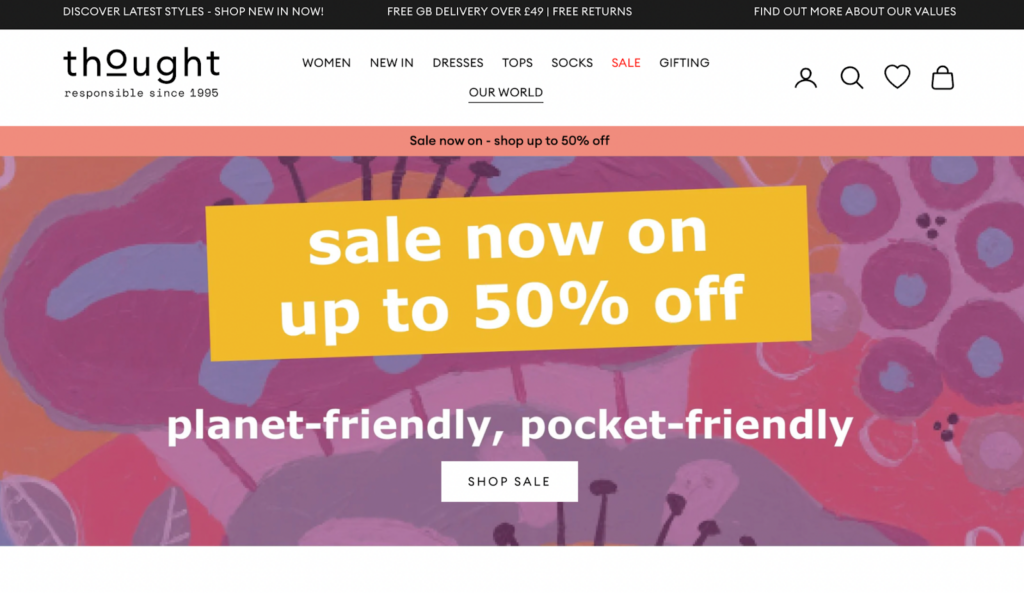
“We’ve sourced the most earth-kind fabrics we could find. So you don’t have to think about it.”
Thought
🌎
How do they ensure their sustainability?
Thought ensures sustainability by using eco-friendly materials and reducing textile waste. They source a high percentage of natural fibers, including organic cotton (40%), bamboo (20%), wool (13%), and hemp (2%). Instead of plastic packaging, they use FSC-certified recycled paper labels and 100% corn-based, compostable paper mailing bags. They also tackle the textile waste problem by partnering with TRAID, offering pre-loved clothing a new lease of life while promoting a circular fashion economy. Lastly, they provide resources to care for and mend clothes to extend their lifespan, lowering the carbon footprint.
🌐
How do they ensure their ethics?
Thought has a Code of Conduct that covers all of the ILO Four Fundamental Freedoms Principles. More and more of their garments are GOTS and Fair Trade Certified™. Their ethical commitment includes upholding animal welfare.
🤝
Are they part of any giving-back programs?
Thought is not known to be part of any giving-back programs.
🛍️
What is their product range?
- Best for: womenswear, menswear, childrenswear
- Product range: shirts, skirts, denim, sweaters, scarves, dresses, pants, jackets, blazers, knitwear, tops, blouses, T-shirts, socks, stockings, tights, shorts, underwear, sneakers, jewelry, jumpsuits, playsuits
- Price range: $$
- Size range: XS–XXL
Fabrics Made With Natural Fibers: Breathable Materials That Biodegrade at the End Of Their Life
Fabrics made with natural fibers are generally more breathable than fabrics made with synthetic fibers, saving water and energy for washing and drying during the usage stage. Natural fibers are generally biodegradable and compostable, enabling various end-of-life options.
Here are the life-cycle stages of natural fabrics and each stage’s sustainability assessment:
- Sourcing natural fibers from farms: Sourcing conventional cotton fibers—the most commonly sourced after natural fibers—is unsustainable. The cotton crop is water-thirsty and pesticide-dependent. Also, the widespread monoculture in cotton cultivation depletes the soil and necessitates synthetic fertilizer in many growing regions. However, the sourcing stage of natural fabrics can be sustainable when raw materials are recycled from waste or obtained from organic farming systems. Additionally, many fiber crops, including linen, hemp, and jute, require little input to provide a high fiber yield while having a strong carbon sequestration potential.
- Manufacturing of natural fiber clothing: The sustainability of manufacturing natural fiber clothing varies depending on the natural fibers used. Manufacturing natural fabrics, such as cotton, wool, and silk, can be unsustainable because the processes are energy, water, and chemical-intensive. In contrast, producing natural fabrics from some plant-based fibers, such as linen, hemp, and kapok, can be sustainable, mainly because it can be done mechanically without adding toxic chemicals.
- Transportation of natural fiber clothing: Transporting natural fabrics is generally unsustainable. It can be a carbon-intensive life-cycle stage for clothing and household items made with natural fibers due to the distances covered and emissions associated with transporting vehicles. Natural fabrics typically travel from fields (where plants or animals are farmed) to factories, then sorting centers, shops, and consumers’ homes before going to recycling centers or landfills.
- Usage of natural fiber clothing: Using natural fabrics is generally sustainable. Natural fabrics are generally breathable. They don’t need to be washed frequently—much less often than synthetic fabrics—thus saving water and energy. Most commonly used natural fibers are strong, meaning materials made with those fibers can last long before a replacement is needed. Lastly, washing natural fabrics doesn’t cause microplastics to be released into the environment.
- End-of-life of natural fiber clothing: The end-of-life stage for natural fabric is generally sustainable. Natural fabrics are made with natural fibers, resulting in the material being biodegradable and compostable.
Some natural fibers, including linen and hemp, are among the most sustainable textile materials. They are durable and biodegradable materials. Fiber crops sequester carbon, helping to mitigate the climate crisis.
Why Is It Important to Buy Products Made of More Sustainable Fabrics
It is important to buy products made from more sustainable fabrics because a sustainable textile industry has a lower carbon footprint, helps save natural resources, and is better for forests, animals, and humans alike.
Buying Sustainable Fabrics Reduces Your Carbon Footprint
The production of clothing and footwear is estimated to contribute 10% of global greenhouse gas emissions—more than all international flights and shipping combined. If the fashion industry were a country, it would be the fourth largest emitter of carbon dioxide.
One way to reduce the carbon footprint of the clothes you buy is to opt for sustainable fabrics. Sustainable fabrics, which are often made with natural or recycled fibers, have relatively low carbon footprints compared to petroleum-based fabrics. For example, organic cotton made in the US has a carbon footprint of 2.35 kg CO2 (per ton of spun fiber)—a quarter of polyester’s carbon footprint.
Buying Sustainable Fabrics Reduces Demand for Natural Resources and Waste Management
The textile industry uses water and land to grow cotton and other fibers. It is estimated that 79 billion cubic meters of water were used for the sector worldwide in 2015. For example, producing a single cotton T-shirt requires as much water as one person drinks for 2.5 years (2,700 liters of fresh water).
Worse yet, the textile economy is vastly more linear than circular: the largest amount of resources used in clothes ended up in landfills (instead of being recycled to remake clothes). According to a report by the Ellen MacArthur Foundation,
- Less than 3% of materials used in the textile economy in 2015 came from recycled sources.
- In other words, more than 97% of resources used in making clothes are newly extracted.
When clothing items are disposed of within a short period of time—under a year in the case of half of the fast fashion clothes—the natural systems that provide raw materials for fabrics don’t have enough time to recover and regenerate, which could lead to ecological breakdown.
Sustainable fabrics are made with less water and emissions while lasting longer:
- Because they are durable, you don’t need to buy new clothes too often.
- Thus, you help reduce the pressure to extract more resources for making new items.
Similarly, making and consuming sustainable fabrics made with recycled materials reduces the demand for virgin materials while helping tackle waste management.
Buying Sustainable Fabrics Encourages Sustainable Management of Forests
Sustainable plant-based fabrics are made with raw materials from forests and plantations that are sustainably managed, such as complying with FSC standards.
When you buy sustainable plant-based fabrics, you discourage unsustainable forestry practices like illegal logging. You can help reduce deforestation, biodiversity loss, and the effects of climate change.
Buying Sustainable Fabrics Encourages Fairer Treatment of Animals
The fashion industry is rife with animal mistreatment when it comes to making animal-based fabrics like wool or silk. Every year, billions of animals suffer and die for clothing and accessories.
Buying sustainable vegan alternatives can help to reduce the pressure on raising more and more animals to meet the demand for animal-based fabrics while sacrificing their well-being and lives.
Suppose you have to buy fabrics made with, for example, wool or silk; make sure you only choose brands committed to cruelty-free products. In that case, you help advocate better treatments for animals raised within the textile industry.
Using Sustainable Fabrics Encourages Fairer Treatment of Textile Workers
Recent statistics from UNICEF estimated as many as 170 million child laborers worldwide, many of whom were engaged in some form of work in the textile industry. They don’t get paid minimum wages and often work long hours.
When you buy sustainable fabrics from brands transparent about the working conditions at their factories, you discourage the use of child labor and help promote better working conditions for textile workers.
How Can You Generally Buy More Sustainable Fabrics
The key to sustainably buying fabrics is to check on relevant environmental and original certifications.
For natural fabrics:
- Global Organic Textile Standard (GOTS): A globally recognized certification system that ensures a certain threshold of organic content has been met. It covers manufacturing, packaging, labeling, transportation, and distribution (but not what happens in the fields where crops are grown).
- USDA Certified Biobased Product: The USDA BioPreferred® Certification is a voluntary certification offered by the United States Department of Agriculture. The certification identifies products made from plants or other renewable materials.
- Ecolabel: Ecolabel is the official European Union voluntary label recognized worldwide for certified products with a guaranteed, independently verified low environmental impact. The label requires high environmental standards throughout the entire life-cycle: from raw material extraction through production and distribution to disposal. It also encourages companies to develop innovative, durable, easy-to-repair, and recyclable products.
For plant-based semi-natural/semi-synthetic fabrics:
- Forest Stewardship Council: An FSC certification ensures that the wood (or wood-like material) comes from responsibly managed forests that provide environmental, social, and economic benefits.
There are two types of FSC Certification:- FSC Forest Management Certification, with a focus on the origin of the wood—the forest.
- FSC Chain of Custody Certification, which focuses on the path from the forest to the customer’s home.
- Program for Endorsement of Forest Certification: PEFC’s approaches to sustainable forest management are in line with protecting the forests globally and locally and making the certificate work for everyone. Getting a PEFC certification is strict enough to ensure the sustainable management of a forest is socially just, ecologically sound, and economically viable but attainable not only by big but small forest owners.
For recycled fabrics:
- Recycled Claim Standard (RCS): The Textile Exchange RCS was originally developed as an international, voluntary standard that sets requirements for third-party certification of Recycled input and chain of custody.
- The Global Recycled Standard (GRS): The Global Recycled Standard (GRS) is an international, voluntary, full product standard that sets requirements for third-party certification of Recycled Content, chain of custody, social and environmental practices, and chemical restrictions. It can be used for any product with more than 20% recycled material.
For all types of fabrics:
- STeP by OEKO-TEX®: STeP by OEKO-TEX® is an independent certification system for brands, retailers, and manufacturers from the textile and leather industry. It communicates organizational environmental measures, including reducing carbon footprint and water usage.
- OEKO-TEX® Standard 100: OEKO-TEX® labels aim to ensure that products pose no risk to human health (i.e. containing banned chemicals).
Some certifications that are signaling brands’ efforts toward lowered environmental impacts and a circular economy are:
- B Corp Certification: The label B Corp is a certification reserved for for-profit companies. Certified holders are assessed on their social and environmental impacts.
- Cradle2Cradle certification: Cradle2Cradle provides a standardized approach to material circularity. It assesses whether products have been suitably designed and made with the circular economy in mind covering five critical categories: material health, material reuse, renewable energy and carbon management, water stewardship, and social fairness.
Final Thoughts
Natural fabrics are on a spectrum from unsustainable to sustainable, largely depending on the farming systems in which animals are raised or the plants are cultivated for the natural fibers, along with the use of energy and chemicals during manufacturing. Natural fibers from plants, in particular, have the climate benefits from plants’ carbon sequestration. Additionally, some natural fibers, such as linen, hemp, and wool, are wonderful textile materials with exceptional strength and breathability.
By purchasing new or pre-loved natural fiber clothes from brands that commit to sustainability, you support their mission to create a fairer and less harmful textile industry for all lives on Earth.
Here is the list (again) of the most sustainable natural fiber clothing brands:
- MATE the Label
- NATASHA TONIC
- Finisterre
- Opera Campi
- Nui Organic
- WAMA
- People Tree
- Beaumont Organic
- VAUDE
- Thought
To make your use of these fabrics even more sustainable, follow these steps:
- Buy second-hand, recycled, or upcycled clothes made with natural fibers
- While using natural fiber clothes, maximize the number of wears between washes and keep them as long as possible.
- At the end-of-life of your natural fiber clothes, upcycle the materials to extend their usage and arrange for them to be recycled or properly disposed of.
Stay impactful,

Sources
- Intechopen: Natural Fibers: The Sustainable Alternatives for Textile and Non-Textile Applications
- Common Objective: REPORTS & TOOLS | Made-By Environmental Benchmark for Fibres
- Science Direct: Life-cycle assessment (LCA)
- Impactful Ninja: How Sustainable Are Hemp Fabrics? A Life-Cycle Analysis
- Impactful Ninja: How Sustainable Are Linen Fabrics? A Life-Cycle Analysis
- Impactful Ninja: How Sustainable Are Natural Fabrics? A Life-Cycle Analysis
- MATE the Label: Home
- NATASHA TONIC: Home
- Finisterre: Home
- Opera Campi: Home
- Nui Organic: Home
- WAMA: Home
- People Tree: Home
- Beaumont Organic: Home
- VAUDE: Home
- Thought: Home
- Good On You: Brand Directory | MATE the Label
- MATE the Label: Linen
- MATE the Label: Hemp
- MATE the Label: Climate-beneficial cotton
- MATE the Label: Alpaca
- MATE the Label: Materials
- MATE the Label: Carbon footprint
- MATE the Label: Dress Clean
- B Corporation: MATE the Label
- CLIMATE NEUTRAL: MATE the Label
- MATE the Label: 2021 Impact Report
- Good On You: Brand Directory | NATASHA TONIC
- NATASHA TONIC: TRANSPARENCY
- Impactful Ninja: How Sustainable Are Organic Cotton Fabrics? A Life-Cycle Analysis
- Impactful Ninja: How Sustainable Are Spandex Fabrics? A Life-Cycle Analysis
- Impactful Ninja: How Sustainable Are Lycra Fabrics? A Life-Cycle Analysis
- CONTENT BEAUTY & WELLBEING: MEET THE MAKER: NATASHA TONIC SUSTAINABLE SWIMWEAR
- 5 Gyres: Home
- CONTEMPORARY FASHION: CHANGING WOMEN’S SWIMWEAR
- Finisterre: Fabric of Finisterre
- Global Organic Textile Standard (GOTS): Home
- Impactful Ninja: How Sustainable Are Merino Wool Fabrics? A Life-Cycle Analysis
- Finisterre: Merino Wool Knitwear Guide
- Finisterre: Recycled Fabrics
- Impactful Ninja: How Sustainable Are Recycled Fabrics? A Life-Cycle Analysis
- Finisterre: Impact Reports
- Finisterre: Repair Workshop
- Finisterre: Finisterre x RESKINNED | REPURPOSING OLD GEAR FOR NEW ADVENTURES
- Finisterre: POSITIVE IMPACT REPORT 2022
- B Corporation: Finisterre
- Finisterre: Finisterre – A Positive Impact Business
- Finisterre: Anti-Slavery and Trafficking Policy
- Fair Working Conditions (FWC): Home
- Finisterre: Factories of Finisterre
- Open Supply Hub: Home
- Finisterre: Sea7 | The Materclasses
- Good On You: Brand Directory | Finisterre
- Finisterre Foundation CIC: Grant Making Policy
- Finisterre: Finisterre Foundation | The Wetsuit Project
- Level Water: Home
- Finisterre: Finisterre Foundation | The Seasuit Project
- Finisterre: Finisterre Foundation | City Kids Surfing
- Opera Campi: RESPONSIBILITY
- Opera Campi: SWEATER ZERO – The Carbon Negative, Undyed Hemp Sweater
- Opera Campi: OUR STORY
- Science Direct: Cradle-to-Gate Assessment
- Opera Campi: MISSION
- Good On You: Brand Directory | Nui Organic
- Nui Organic: Materials
- Impactful Ninja: How Sustainable Are Alpaca Wool Fabrics? A Life-Cycle Analysis
- Impactful Ninja: How Sustainable Are Silk Fabrics? A Life-Cycle Analysis
- OEKO-TEX: OEKO-TEX Standard 100
- Bluesign: Home
- Nui Organic: Sustainability
- Nui Organic: Factories
- Nui Organic: Merino Wool
- PrAna: Responsible Packaging Movement
- Nui Organic: (re) Nui
- Impactful Ninja: How Sustainable Are Organic Hemp Fabrics? A Life-Cycle Analysis
- WAMA Underwear: Our Story
- WAMA Underwear: Our Supply Chain
- Science Direct: Retting method
- OEKO-TEX® : Home
- AMFORI: Is BSCI a certificate, a label or a standard?
- ETHICAL MADE EASY: WAMA Underwear
- WAMA Underwear: SUPPLIER CODE OF CONDUCT
- Good On You: Brand Directory | WAMA
- Green America Certified Business: Home
- PETA-Approved Vegan: Search
- People Tree: Home
- Impactful Ninja: How Sustainable Are Natural Fabrics Fabrics? A Life-Cycle Analysis
- Impactful Ninja: How Sustainable Are Semi-Natural/ Semi-Synthetic Fabrics Fabrics? A Life-Cycle Analysis
- Impactful Ninja: How Sustainable Are TENCEL Fabrics? A Life-Cycle Analysis
- Good On You: Brand Directory | People Tree
- People Tree: Our Story
- One World Shop: 10 Principles of Fair Trade
- Beaumont Organic: Home
- Good On You: Brand Directory | Beaumont Organic
- Beaumont Organic: Shipping & Delivery
- Beaumont Organic: Repair Scheme
- Beaumont Organic: Resale Scheme
- VAUDE: CSR Report | Produce Philosophy
- Good On You: Brand Directory | VAUDE
- VAUDE: CSR Report | Don’t wash any more than necessary
- VAUDE: CSR Report | Repair Don’t Replace
- VAUDE: CSR Report | Second-hand and donations
- VAUDE: CSR Report | Upcycling
- VAUDE: CSR Report | Material Policy
- VAUDE: CSR Report | Wool
- Green Button: Home
- Science Based Targets (SBTi): Home
- VAUDE: CSR Report | Climate Footprint
- VAUDE: CSR Report | Climate-Neutral Business
- VAUDE: CSR Report | Our Producers
- FairWertung: Home
- Thought: Our Materials
- Thought: Zero plastic packaging
- Thought: Thought x TRAID
- Thought: Aftercare
- Good On You: Brand Directory | Thought
- Thought: Responsible Sourcing
- European Parliament: The impact of textile production and waste on the environment (infographic)
- Science Direct: The challenge of “Depeche Mode” in the fashion industry – Does the industry have the capacity to become sustainable through circular economic principles, a scoping review
- Science Direct: Carbon Footprint of Textile and Clothing Products
- European Parliament: Environmental impact of the textile and clothing industry
- European Parliament: What if fashion were good for the planet?
- Ellen MacArthur Foundation: A New Textiles Economy: Redesigning fashion’s future
- McKinsey: Style that’s sustainable: A new fast-fashion formula
- Forest Stewardship Council: Home
- Our World in Data: Deforestation and Forest Loss
- Our World in Data: Renewable Energy
- Peta: Animals Used For Clothing
- The Guardian: Child labour in the fashion supply chain
- BioPreferred: WHAT IS THE BIOPREFERRED PROGRAM?
- European Commission: Environment | EU Ecolabel
- Forest Stewardship Council
- FSC Forest Management Certification
- FSC Chain of Custody Certification
- Program for Endorsement of Forest Certification
- Textile Exchange: The RCS and GRS are designed to boost the use of recycled materials.
- OEKO-TEX: Certification according to STeP by OEKO-TEX®
- B Corp Certification: Home
- C2CCertified: Home





